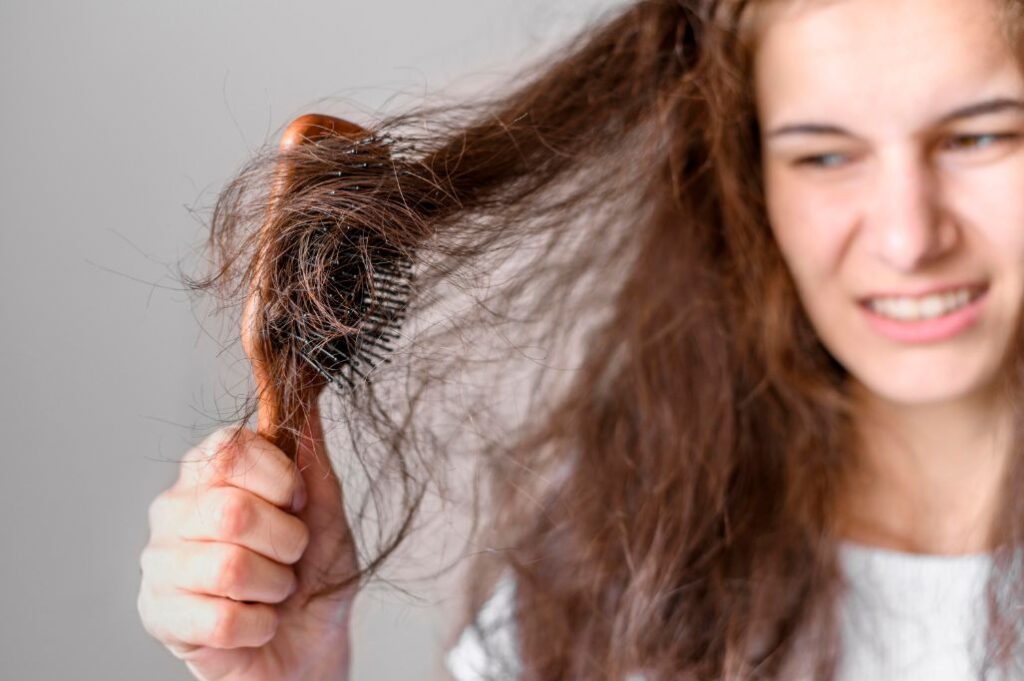Understanding Sudden Hair Loss in Women
There are several reasons why women experience sudden hair loss, which is frequently a silent but upsetting problem. Hormone imbalances can result in substantial shedding, especially during pregnancy or menopause. Stress on both a physical and emotional level can also cause hair fall. Iron, vitamin D, and protein deficits in particular can damage hair at the root and cause loss. The best Derma Consultant in Aurangabad is here to help you.
The first step in solving the problem involves understanding these reasons. Modest dietary, lifestyle, and hair care adjustments can help lessen the severity of this illness. It’s crucial to keep an eye out for any patterns in hair loss and speak with a medical professional to identify the underlying cause and the best course of action.
Typical Reasons for Women’s Sudden Hair Loss
While it might be unsettling for women to experience sudden hair loss, the first step in receiving successful treatment is figuring out the cause. These are a few of the typical causes:
Hormonal Imbalances:
Hair loss may result from hormonal fluctuations, particularly those that occur during pregnancy, the postpartum period, menopause, or as a result of PCOS.
Stress:
Stress can lead to temporary hair loss on both an emotional and physical level.
- Stressful life situations such as divorce or a death in the family might cause hair loss.
- Hair loss may result from physical stress brought on by sickness, surgery, or a high temperature.
Nutritional Deficiencies:
The condition of hair can be impacted by a lack of vital nutrients.
- One of the main causes is iron deficiency, which is frequent in women because of menstruation or insufficient food consumption.
- As protein makes up the majority of hair, a protein deficit can also cause hair loss.
- Vitamin D, zinc, and vitamin B (including biotin) are among the vitamins and minerals that are essential for healthy hair development and retention.
Medical Problems:
Hair loss may result from a few different medical problems.
- Hair loss can result from thyroid conditions, including both hyperthyroidism and hypothyroidism.
- Alopecia areata is one of the autoimmune illnesses that targets hair follicles.
- Patchy hair loss can result from scalp illnesses such as ringworm.
Harsh Hair Care Practices:
A few haircuts and hair treatments can break or fall out your hair.
- Traction alopecia is caused by tight hairstyles that strain on the scalp, such as braids or ponytails.
- Hair can become weaker due to overuse of heat styling tools and chemical treatments (such as relaxers, dyes, and perms).
Hair-Friendly Schedule
Women who experience abrupt hair loss can greatly minimize it with a mild hair care regimen. This entails applying a gentle wash, steering clear of hot water that may deplete the scalp’s natural oils, and consistently utilizing a conditioner to strengthen hair. Damage and breakage can be avoided by limiting the use of heat-styling tools and harsh chemical treatments. Split ends can be lessened and hair can stay healthier with regular trims. It is also advantageous to stay away from tight haircuts that strain the scalp and hair. Choose loose, cozy styles instead, as they reduce stress and breakage.
When to Seek Advice from Experts
Professional assistance is required if you are experiencing increased hair loss, an itchy scalp, or discomfort in your scalp. We at Dermaconsult Clinic, the best hair clinic in Aurangabad are prepared to handle these problems with practical solutions, such as cutting-edge hair loss treatments. Consult Dr. Waseemuddin Shaikh for any hair-related issues.
Read More About The CHEMICAL PEELS: EVERYTHING YOU NEED TO KNOW.


